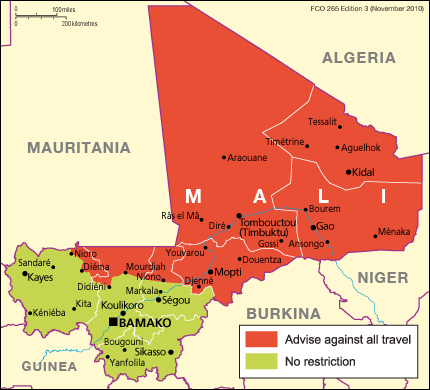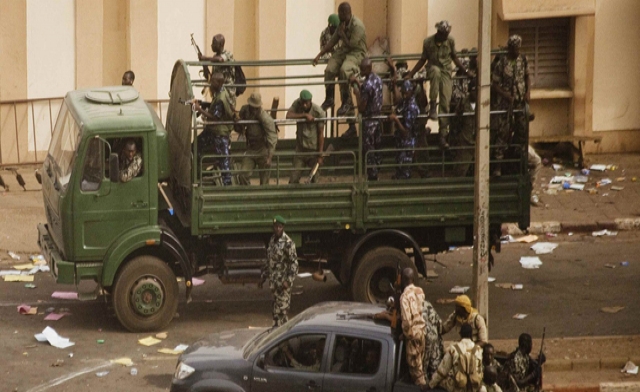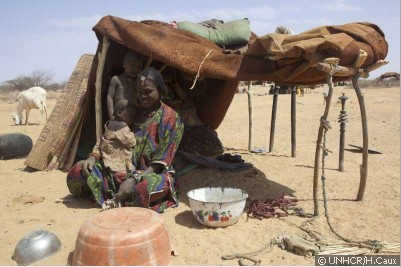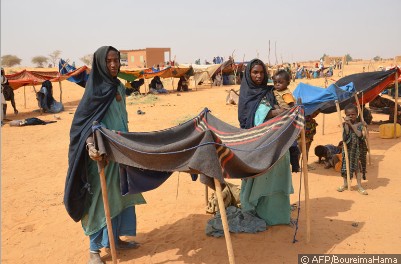(article updated on 2012.6)
姩息зЪДпЉМеПИдЊЖдЇЖпЉБжѓПжђ°еЪіиВЕзЪДи¶БеОїеЃМжИР姥жГ≥пЉМе∞±жЬГжЬЙйАЩдЇЫдЇЛжГЕзЩЉзФЯгАВ
еЊЮ2008еєі3жЬИйЦЛеІЛжЦЉKidal еЬ∞еНАзЩЉзФЯжИ∞дЇВпЉМзХґеЬ∞зЪДгАЭеМЧйЭЮеЗ±йБФжБРжАЦзµДзєФ AQIMгАЮ йЩЄзЇМзґБжЮґдЄАдЇЫи•њжЦєдЇЇзХґдЇЇи≥™гАБзФЪиЗ≥жЬЙзЪДе∞±еЬ∞иЩХж±ЇпЉМ2011еєізґБжЮґжШѓдїґжЫіжШѓй†їзєБгАВдїКеєі1жЬИ17жЧ•еПНеПЫиїНгАЭеЬЦйШњйЫЈж†ЉжЧП(Touareg)гАЮиИЗжФњеЇЬиїНз†іе£ЮеЈ≤зґУзґ≠зєЂ3еєізЪДеТМеє≥зУ¶иІ£пЉМеЬ®й¶ђеИ©еМЧжЦєзИЖзЩЉжИ∞зБЂпЉМињЂдљњдЄАе†ЖйЫ£ж∞СйАГеЊАйВКеҐГеЬЛеЃґпЉМиАМжЙАжЬЙжЧЕеЃҐдєЯйÚ襀й©ЕйАРйЫҐйЦЛгАВ
жГ≥и¶БжОҐи®™зЪДTimbuktuж≥•еЈіжЄЕзЬЯеѓЇгАБCure Salee жЄЄзЙІж∞СжЧПзѓАгАБDogon Mask Dance е§Ъи≤ҐйЭҐеЕЈиИЮеДАеЉПйГљеЬ®й¶ђеИ©еМЧйГ®гАВзПЊеЬ®дЄНеП™жШѓй¶ђеИ©еҐГеЕІзЩЉзФЯзґБжЮґиИЗжИ∞дЇВпЉМйА£й¶ђеИ©еМЧйГ®иИЗйШњзИЊеПКеИ©дЇЮ(Algeria)гАБе∞ЉжЧ•(Niger)гАБиМЕеИ©е°Фе∞ЉдЇЮ(Mauritania)гАБе•ИеПКеИ©дЇЮ(Nigeria)йВКзХМиЦ©еУИжЛЙж≤ЩжЉ†жґµиУЛеНАеЯЯйГљжЬЙеЗ±йБФжБРжАЦзµДзєФгАВиЛ±еЬЛдЄЙжЬИеИЭ詶еЬЦжЛѓжХСеЬ®е•ИеПКеИ©дЇЮеМЧйî襀зґБжЮґзЪДдЇЇи≥™и°МеЛХ姱жХЧпЉМеЕ©еРНдЇЇи≥™иҐЂиЩХж±ЇгАВй¶ђеИ©жФње±АдЄАеРСз©©еЃЪпЉМдљЖеИ©жѓФдЇЮеЉЈдЇЇж†ЉйБФи≤їеЮЃеП∞дєЛеЊМпЉМзВЇдїЦжХИеСљзЪДеЬЦзУ¶йЫЈж†ЉжЧП(Touareg)еВ≠еЕµжФЬеЄґе§ІжЙєж≠¶еЩ®ињФеЫЮй¶ђеИ©пЉМе∞Зй¶ђеИ©иЃКжИРзБЂиЧ•еЇЂгАВжЬАињС(3жЬИ22жЧ•)й¶ђеИ©иїНдЇЇзµДжИРзЪДгАМеЬЛеЃґж∞СдЄїеЃЙзљЃеІФеУ°жЬГгАНе∞НжЦЉжФњеЇЬе∞НеМЧжЦєеЬЦзУ¶йЫЈж†ЉжЧПеПЫдЇВж≤ТжЬЙдљЬзВЇиАМдЄНжїњпЉМзЩЉеЛХиїНдЇЛжФњиЃКпЉМзЄљзµ±иРљиНТиАМйАГпЉМеРМжЩВеЃ£еЄГеЕ®еЬЛеѓ¶жЦљеЃµз¶БгАВ
еОїй¶ђеИ©пЉМжШѓгАМзђђеЕ≠еАЛ姥жГ≥гАНпЉМз≠ЙдЇЖеНБеєЊеєідЇЖпЉМеЃМжИРеЊМе∞±и¶БзХґдЄНе±ђдїїдљХеЦЃдљНзЪДйЪ±е±Едњ†е•≥еОїгАВ2004еєіи¶БеОїеЫ†зИЖзЩЉзМЫзГИжАІеЖЈеЗНиВ©зД°ж≥ХеОїпЉМеПИеЖНз≠ЙеЕЂеєіпЉМдїКеєі(2012еєі)жЇЦеВЩеЈЃдЄНе§ЪдЇЖпЉМжХіи£ЭжГ≥еОїпЉМеЕЂз®Ѓй†РйШ≤йЗЭпЉИеМЕжЛђеЊИи≤ізЪДйїГзЖ±зЧЕпЉЙйГљжЙУдЇЖпЉМжИСзЬЯзЪДжЇЦеВЩе•љзЩЊеИЖдєЛе•љеєЊзЩЊзЪДж±ЇењГи¶БеОїпЉМдљЖ襀йАЩйЩ£е≠Рй¶ђеИ©иИЗи•њеМЧйЭЮ姩息зЪДжГЕе˥絶жЙУжХЧгАВ
жѓПжђ°йАЩдЇЫжґИжБѓдЄАдЊЖпЉМжИСзЪДж±ЇењГйГљзД°е•ИзЪД襀жЙУжУКдЄАжђ°пЉМ䪶襀жЙ£еИЖпЉМйВДжШѓдЄНж≠їењГдїНжГ≥еОїпЉМдљЖй¶ђеИ©йЩЄзЇМдЄАйА£дЄ≤дЄАзЩЉдЄНеПѓжФґжЛЊзЪДжЕШзЛАпЉМжЙАжЬЙжЧЕеЃҐйÚ襀й©ЕйАРеЗЇеҐГпЉМз∞љи≠ЙдєЯж†єжЬђдЄЛдЄНдЊЖгАВйАЩйЩ£е≠РењГжГЕжЫЊгАЭжВґгАЮеИ∞жЬАйЂШйїЮпЉМгАЭжДЯеШЖпЉБгАЮдєЯжЫЊжОЙжїњеЬ∞пЉМжЬАеЊМдїКеєійЬАеБЪеЗЇзЧЫиЛ¶ж±ЇеЃЪ-гАЭйїГзЙЫгАЮгАВ
еФЙпЉБйАЩйЇЉзЊОгАБйАЩйЇЉе§ЪжЦЗеМЦиЧЭи°УзЪДеЬЛеЃґеПИе∞ЗеЬ®дЇЇй°Юж∞ЄйБ†еРµдЄНеЃМзЪДзіЫдЇВдЄ≠絶熳е£ЮдЇЖгАВеОЯжЬђжШѓиґЯжµ™жЉЂжДЯжАІзЪДжЦЗеМЦдєЛжЧЕпЉМжЬ™дЊЖеПѓиГљеПИи¶БеГПжЭ±йЭЮйВ£иґЯи°Мз®ЛпЉМиЃКжИРиЛ¶йЫ£жИ∞дЇВ冱е∞ОдєЛжЧЕгАВ
й¶ђеИ©пЉМеЊМжЬГжЬЙжЬЯгАВжЬ™дЊЖпЉМжИСдЄАеЃЪжЬГеОїзЪДпЉБжЬГеОїиЈЯзЙІж∞СдЄАиµЈеЬ®ж≤ЩжЉ†жЄЄзЙІпЉМ иЃУзФЯжіїеЫЮеИ∞жЬАеОЯеІЛзЪДи°Миµ∞иИЗзФЯе≠ШзЫЃзЪДгАВ
вЧП й¶ђеИ©зЪДжГЕеЛҐ (2011.11 ~ 2012)
и®їпЉЪAQIM (Al Qaeda in the Islamic Maghreb)жШѓиУЛйБФжБРжАЦзµДзєФеЬ®й¶ђеИ©зЪДеИЖжФѓгАВ
зіЕиЙ≤еНАеЯЯзВЇеН±йЪ™еНАеЯЯзЫЃеЙНдїНеЪіз¶БйА≤еЕ• (еЬЦзЙЗдЊЖжЇР)
姩息зЪДпЉБжГ≥еОїзЪДеЬ∞жЦєзПЊеЬ®йÚ襀з¶Бж≠ҐдЇЖпЉБдЄЛеИЧж®Щи®ШеЯОеЄВйÚ襀еМЧйЭЮиУЛйБФжИЦеПЫиїНдљФй†ШгАВ
еЪіз¶БйА≤еЕ•еНАеЯЯжЬЙпЉЪпЉИKidal, Gao, Koulikoro (north of Mourdiah), S√©gou (north of Niono), Tombouctou (including the city of Tombouctou (Timbuktu)), Mopti, and areas bordering Mauritania east of Nioro in the Kayes provinceпЉЙ

зЕІзЙЗдЊЖжЇРпЉЪAL Arabiya News

зЕІзЙЗдЊЖжЇРпЉЪUNHCR


й¶ђеИ©иИЗи•њеМЧйЭЮжЬАжЦ∞зЛАж≥БпЉЪ
. и•њйЭЮй†ШиҐЦ еПђйЦЛй¶ђеИ©еН±ж©Яе≥∞жЬГ (ж≥ХжЦ∞з§Њ 2012/04/02)
. й¶ђеИ©иїНдЇЛжФњиЃК зЄљзµ±иРљиНТиАМйАГ (дЄ≠еЬЛжЩВ冱 2012/03/23)
. й¶ђеИ©е£ЂеЕµеПЫиЃК еЃ£еЄГеѓ¶жЦљеЃµз¶Б (дЄ≠е§Ѓз§ЊвХ±еЈій¶ђзІС22жЧ•зґЬеРИе§Цйۿ冱е∞О 2012/03/22)
. й¶ђеИ©е£ЂеЕµиЃКзѓА еЃ£з®±жФїеН†зЄљзµ±еЇЬ (иБѓеРИжЩЪ冱2012/3/22)
вАІ Mali coup leaders close all borders amid condemnation from Washington and Africa (2012.03.22)
вАІ Mali president вАШsafeвАЩ after fleeing from overnight rebel coup (2012.03.22)
вАІ Tuareg rebels take Mali garrison town, say sources (2012.03.20)
вАІ Mali Tuareg rebels deny Qaeda (2012.02.24)
. иЛ±еЬЛжЛѓжХСдЇЇи≥™е§±жХЧ дЇЇи≥™иҐЂиЩХж±ЇпЉИдЄ≠е§Ѓз§ЊвХ±зЊЕй¶ђ9жЧ•зґЬеРИе§Цйۿ冱е∞О (2012/03/08пЉЙ
. и•њйЭЮй¶ђеИ©еЕІжИ∞ йАЊ2иРђйЫ£ж∞СйАГдЇ° пЉИдЄ≠е§Ѓз§ЊвХ±зіДзњ∞е∞ЉжЦѓе†°7жЧ•е∞ИйЫї (2012/02/08пЉЙ
. й¶ђеИ©еКЂж°И еМЧйЭЮиУЛйБФзµДзєФи™НдЇЖ пЉИе§ІзіАеЕГ 2011/12/12пЉЙ
. еЗ±йБФзµДзєФеЬ®йЭЮжі≤й¶ђеИ©зґБжЮґ5еРНе§ЦеЬЛдЇЇ пЉИйЫЕиЩОе•ЗжС© 2011/12/9пЉЙ
. UNHCR steps up emergency response to crisis in Mali (2012/2/7)
. Mali: Qaeda Group Claims Kidnap of Five Europeans in Country (2011/12/9)
. l-Qaeda gunmen execute tourist after bursting into restaurant and kidnapping three men in Timbuktu (2011/11/26)
. Mali travel advice from UK warning
Threats¬† to Safety¬† and Security in Mali and Sub Saharan Africa (и≥ЗжЦЩдЊЖжЇРгАБUNHCR)
The U.S. Department of State and the U.S. Embassy in Bamako recommends against U.S. citizens traveling to the northern regions of Mali вАУ Gao, Kidal, and Timbuktu. The terrorist group Al Qaeda in the Islamic Maghreb (AQIM) continues to use northern Mali as a safe haven and platform from which to conduct operations. As noted in the Department of StateвАЩs current Travel Warning for Mali and the Worldwide Caution, AQIM has declared its intention to attack Western targets throughout the Sahel (including Mali, Mauritania, and Niger), and has claimed responsibility for the following recent kidnappings/attempted kidnappings and other violent events:
- 2012.04.02 – DAKAR (AFP) вАУ West African leaders gathered in Dakar on Monday for a meeting on the unfolding crisis in Mali, in which they are expected to decide whether to cut off MaliвАЩs trade and financial ties to its neighbours.
- 2012.03.31 – The British Embassy in Bamako warning : We advise against all travel to Mali. Some flights are operating but are heavily subscribed. Given ongoing instability in the country, and now that the airport has re-opened, you should leave if you have no pressing need to remain.
- 2012.03.08 – Hostages killed in failed rescue attempt to free him from captors in Nigeria
- 2012.03.02 – Refugees from Mali continue to arrive in neighbouring countries
- 2012.02.20 – Shops and businesses in Bamako are re-opening. The Embassy has resumed operating a normal service.
- 2012.02.17 – UNHCR boosts aid as Mali outflow doubles in size
- 2012.02.14 – UNHCR set to help relocate thousands of Malian refugees from borders
- 2012.02.07 – UNHCR addresses needs of 20,000 forced to flee violence in Mali
- 2012.02.07 – UNHCR steps up emergency response to crisis in Mali
- 2012.02.07 – Violence in northern Mali forces over 20,000 into exile
- 2011.12.20 – Mauritanian military police were attacked in Adel Begrou, near the Mali border. One Gendarme was kidnapped in the attack.
- 2011.11.25 – Four tourists were attacked in Tombouctou. One was killed and three others kidnapped. The Malian authorities subsequently evacuated all foreign tourists from Tombouctou.
- 2011.11.24 – Two French nationals were kidnapped from a hotel in the town of Hombori, to the north east of Mopti.
- 2011.01.05 – The French Embassy in Bamako was attacked by an individual using explosives and a handgun.
- 2011.02.05 вАУ Italian woman kidnapped in Southern Algeria (Still being held hostage).
- 2011.02.02 вАУ Vehicle-Borne Improvised Explosive Device attack foiled by Mauritanian security forces outside of Nouakchott, Mauritania.
- 2011.01.07 вАУ Two French nationals kidnapped and executed shortly thereafter in Niamey, Niger.
- 2011.01.05 вАУ An individual claiming connections to AQIM attacked the French Embassy in Bamako, Mali with a handgun and improvised explosive device.
- 2010.09.16 вАУ Five French citizens, a Togolese citizen, and a Malagasy citizen were kidnapped in Northern Niger. The Togolese, Malagasy, and one French citizen were released, but four French citizens are still being held by AQIM.
- 2010.04.01 вАУ French NGO worker kidnapped in Niger, executed by captors on July 24, 2010.
- 2009.12.18 вАУ Two Italian citizens kidnapped in southeastern Mauritania on the road to Mali and held in Mali (both were subsequently released).
- 2009.11.29 вАУ Three Spanish citizens kidnapped traveling between the Mauritanian capital of Nouakchott and port of Nouadhibou, and later held in Mali (all three were subsequently released).
- 2009.11.25 вАУ French citizen kidnapped near the city of Menaka (subsequently released).
- 2009.11.14 вАУ An attempted kidnapping of U.S. government employees by heavily armed individuals in Tahoua, Niger.
- 2009.08.08 вАУ Suicide-bombing against French Embassy officials in Mauritania.
- 2009.06.23 вАУ The murder of a U.S. citizen in Mauritania.
- 2009.01.22 вАУ Four European tourists kidnapped on the Mali-Niger border and held in Mali. Three were released, but a British national who was part of this group was later executed.
- 2008.12.14 вАУ Two Canadian citizen United Nations officials kidnapped north of the Nigerien capital of Niamey and held in Mali (both subsequently released).
The threat posed by AQIM, potential Tuareg unrest, sporadic banditry, run-ins with traffickers, and the porous nature of MaliвАЩs northern borders with Algeria, Niger, and Mauritania all reinforce longstanding security concerns affecting travel to northern Mali. In many, if not all, of the above listed kidnapping cases, the individuals were held in northern Mali even though most were not kidnapped there. In addition to threats posed by AQIM and potential hostage takers, there have been confrontations between the Malian military and Tuareg rebel groups in Nampala (along MaliвАЩs frontier with Mauritania) in December 2008, and in the region of Kidal in January 2009. Additionally, the Sahel has been used by traffickers in arms, drugs, and people because of its remoteness and centralized location between Europe and Sub-Saharan Africa for hundreds of years. While these elements usually attempt to avoid contact with outsiders, even an accidental encounter could generate a violent response due to the illicit nature of their activities.
The U.S. Embassy in Bamako has designated the three northern regions of Mali as “restricted without prior authorization" for purposes of travel by U.S. government employees, contractors, grantees, and their dependents. Prior to traveling to these areas, U.S. government employees are required to have the written approval of the U.S. ambassador to Mali. Though this restriction does not apply to private U.S. citizens, it should be taken into account by all U.S. citizens contemplating travel to Mali. The restriction is in effect for the following regions:
- Kidal;
- Gao, including the road to Ansongo and the border with Niger; and
- Timbuktu (Tombouctou).
Although the we place the highest priority on the safe recovery of kidnapped U.S. citizens, it is U.S. policy not to make concessions to kidnappers. Consequently, our ability to assist kidnap victims is limited.
For the latest security information, U.S. citizens traveling abroad should regularly monitor the Bureau of Consular Affairs website, Travel Warnings and Travel Alerts, as well as the current Worldwide Caution.
